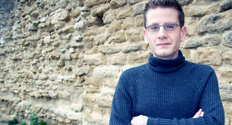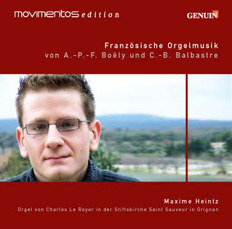Maxime Heintz
Organ

? Music critics consider you to be one of the most important French organists of the younger generation. Aren’t early plaudits of this kind an impediment to an artist’s ongoing development?
MH The process of reaching maturity as a musician is of great importance. If it unfolds in the right way, it can be compared with a “crescendo.” You should not take things too quickly and you must not fall prey to marketing hype and promises not related to your specialization. Too many young musicians have appeared on the concert podium only to disappear from sight a few years later because they forced their development.
? You were raised in a family which did not surround you with music to promote your musical gifts. How was your talent discovered?
MH Since I was not raised in a family of musicians but in a working class family where music never played a role, it took me a long time to assert myself. I discovered music on my own at a late stage, but I never wanted to do anything else except music. I overcame all resistance and began studying the organ; enrolling at the conservatory meant having to give up my schooling because I left school quite early. But the hard work is bearing fruit: I am becoming successful, and that is very reassuring for my parents, for they were concerned about my future.
? Where did you study?
MH I began my studies in Montelimar in 1995 with Pierre Simonet. He was the one who opened the door to music for me. It is true that he is no great “technician” but a true, instinctive musician. Then I went to the conservatory in Marseilles where I worked with André Rossi. With him I mainly worked on Early Music repertory, in which he excelled. Because I found this repertory so appealing I continued with Norbert Pétry in Metz. Then, during a competition, I met Louis Robilliard, with whom I am studying now. He is one of the greatest organists that has ever lived. He introduced me to the literature of the nineteenth and twentieth centuries.
? The great French organists pursued their careers in Paris or Lyon. Why did you return to Grignan?
MH It is true that Paris and Lyon are two large cities with a flourishing cultural life that have been the jumping off point for a large number of organists. There are undoubtedly more opportunities to become well-known there. I initially wanted to stay in Grignan because of family ties; at the same time, I am extremely fond of the organs in the region and the whole interest in the organ that has emerged in recent years, also in part due to my efforts. I have now been the organist at the Collégiale in Grignan for thirteen years; this has given me very great opportunities for practicing because the organ there is available to me at any time. This allowed me to appear more frequently in recitals and concerts in the region. Nevertheless, I hope that this regional focus will not keep me from developing a career in France and perhaps also very soon internationally as well.
? In 2007 you won Second Prize at an organ competition in Paris bearing the name of the most influential French organ teacher, Marie-Claire Alain. That could have motivated you to stay in Paris.
MH I did not want that. I preferred to return to Grignan. I was already well known here in the region. And winning the prize also gave me a national reputation. At the competition I realized how tough the competition is in Paris. ? How strongly attached do you feel to the French tradition? Aren’t you also searching for an approach lying outside the bounds of tradition?
Interview: Felix Schmidt
? Music critics consider you to be one of the most important French organists of the younger generation. Aren’t early plaudits of this kind an impediment to an artist’s ongoing development?
MH The process of reaching maturity as a musician is of great importance. If it unfolds in the right way, it can be compared with a “crescendo.” You should not take things too quickly and you must not fall prey to marketing hype and promises not related to your specialization. Too many young musicians have appeared on the concert podium only to disappear from sight a few years later because they forced their development.
? You were raised in a family which did not surround you with music to promote your musical gifts. How was your talent discovered?
MH Since I was not raised in a family of musicians but in a working class family where music never played a role, it took me a long time to assert myself. I discovered music on my own at a late stage, but I never wanted to do anything else except music. I overcame all resistance and began studying the organ; enrolling at the conservatory meant having to give up my schooling because I left school quite early. But the hard work is bearing fruit: I am becoming successful, and that is very reassuring for my parents, for they were concerned about my future.
? Where did you study?
MH I began my studies in Montelimar in 1995 with Pierre Simonet. He was the one who opened the door to music for me. It is true that he is no great “technician” but a true, instinctive musician. Then I went to the conservatory in Marseilles where I worked with André Rossi. With him I mainly worked on Early Music repertory, in which he excelled. Because I found this repertory so appealing I continued with Norbert Pétry in Metz. Then, during a competition, I met Louis Robilliard, with whom I am studying now. He is one of the greatest organists that has ever lived. He introduced me to the literature of the nineteenth and twentieth centuries.
? The great French organists pursued their careers in Paris or Lyon. Why did you return to Grignan?
MH It is true that Paris and Lyon are two large cities with a flourishing cultural life that have been the jumping off point for a large number of organists. There are undoubtedly more opportunities to become well-known there. I initially wanted to stay in Grignan because of family ties; at the same time, I am extremely fond of the organs in the region and the whole interest in the organ that has emerged in recent years, also in part due to my efforts. I have now been the organist at the Collégiale in Grignan for thirteen years; this has given me very great opportunities for practicing because the organ there is available to me at any time. This allowed me to appear more frequently in recitals and concerts in the region. Nevertheless, I hope that this regional focus will not keep me from developing a career in France and perhaps also very soon internationally as well.
? In 2007 you won Second Prize at an organ competition in Paris bearing the name of the most influential French organ teacher, Marie-Claire Alain. That could have motivated you to stay in Paris.
MH I did not want that. I preferred to return to Grignan. I was already well known here in the region. And winning the prize also gave me a national reputation. At the competition I realized how tough the competition is in Paris. ? How strongly attached do you feel to the French tradition? Aren’t you also searching for an approach lying outside the bounds of tradition?
Interview: Felix Schmidt
CDs released by GENUIN
with Maxime Heintz










